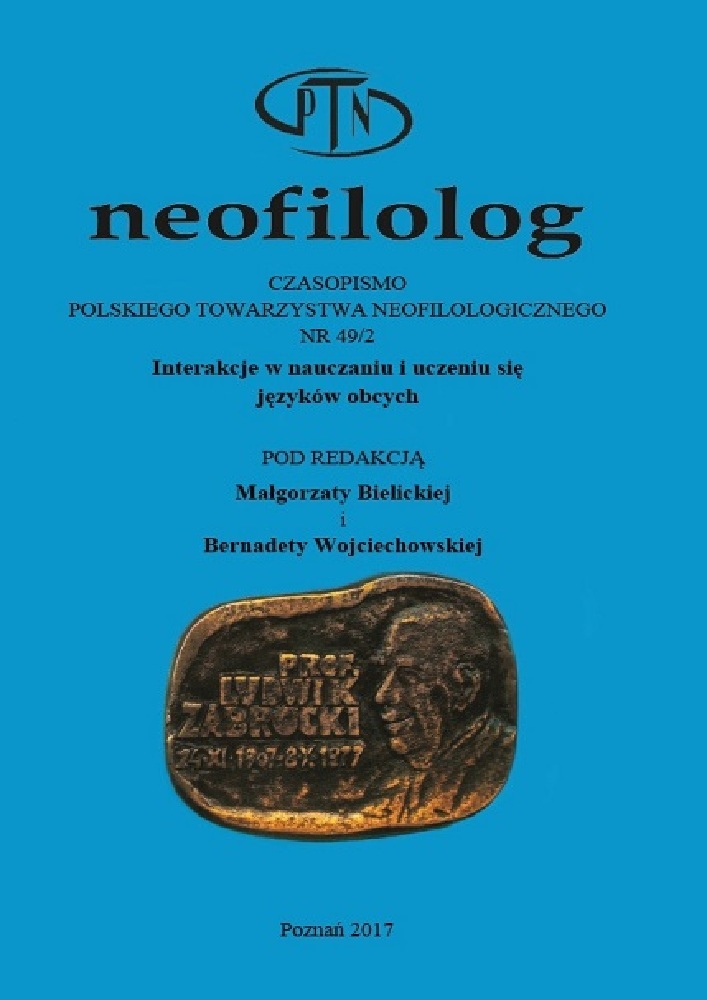Résumé
Interaction between the learner and teacher in the context of Foreign Language for Specific Purposes (FLSP) is characteristic in that often the learner has greater specialist knowledge than the teacher for reasons of experience, or because they work professionally in the field. The purpose of this article is to define the factors impacting on this relationship and analyze possible difficulties for the teacher. The empirical part describes a pilot study with the aim of analyzing responses from eight FLSP teachers.
Références
Dzięcioł-Pędich, A. 2016. „Online Forums as a Mirror Reflecting the World of ESP”. Journal of Language and Education, 2: 24-30.
Goodyear, P. 2005. „Educational design and networked learning: Patterns, pattern languages and design practice”. Australasian Journal of Education Technology, 21: 82-101.
Grucza, S. 2010. „Nowe platformy dydaktyczne: Lingwistyczne Inteligentne Systemy Translo- i Glottodydaktyczne (LISTiG)”. Lingwistyka Stosowna, 3: 167-178.
Grygiel, M. 2015. „In Search of a Theory of Business English”. (w) LSP Perspectives. (red. B. Borkowska-Kępska, G. Gwóźdź, P. Mamet). Dąbrowa Górnicza: Wydawnictwo Naukowe Wyższej Szkoły Biznesu w Dąbrowie Górniczej, str. 75-87.
Kic-Drgas, J. 2014. „Effective Business English Teaching and Learning”. Global Management Journal, 6: 82-87.
Mesh, L. J. 2010. „Collaborative language learning for Professional Adults”. Electronic Journal of e-Learning, 8: 161-172.
Rudnicka, A. i J. Reichel. 2016. „Edukacja w zakresie społecznych i ekologicznych aspektów zarządzania z wykorzystaniem pedagogiki aktywnego uczenia się i serious games”. (w) Języki specjalistyczne. Edukacja – Perspektywy – Kariera. (red. J. Makowski). Łódź: Wydawnictwo Wydziału Filologicznego Uniwersytetu Łódzkiego, str. 11-28.
Sowa, M. 2016. „Nauczyciel języka czy nauczyciel zawodu? Kompetencje nauczyciela języka specjalistycznego”. (w) Języki specjalistyczne w badaniach i praktyce. (red. J. Łącka-Badura). Katowice: Wydawnictwo Uniwersytetu Ekonomicznego w Katowicach, str. 139-157.
Szerszeń, P. 2014. Platformy (glotto)dydaktyczne. Ich implementacja w uczeniu specjalistycznych języków obcych. Warszawa: IKL@.
Ushioda, E. i Z. Dörnyei. 2012. „Motivation”. (w) The Routledgehandbook of second language acquisition. (red. S. Gass i A. Mackey). New York: Routledge, str. 396-409.
van de Bogart, W. 2009. Developing a Pedagogy for Active Learning (PAL). Part 1: Including a brief history of Active Learning in Thailand. Academic Journal Thammasat University. Bangkok. http://www.earthportals.com/Portal_Messenger/ActiveLearning.html [17.11.2017].
Licence
© Joanna Kic-Drgas 2017

Ce travail est disponible sous licence Creative Commons Attribution - Pas de Modification 4.0 International.
Auteurs :
Les auteurs de textes acceptés pour publication dans la revue Neofilolog sont tenus de remplir, signer et renvoyer à l'adresse de la rédaction, un accord sur l'octroi d'une licence gratuite pour les œuvres, avec obligation d'accorder une sous-licence CC.
En vertu de cet accord, les auteurs des textes publiés dans la revue Neofilolog accordent à l'Université Adam Mickiewicz de Poznań une licence non exclusive et gratuite et permettent l'utilisation de la sous-licence Creative Commons Attribution-NoDerivatives 4.0 International (CC BY-ND 4.0).
Les auteurs se réservent le droit de disposer librement de l'œuvre.
Utilisateurs :
Les utilisateurs d'Internet intéressés ont le droit d'utiliser les œuvres publiées à partir de l'année 2017 sous réserve des conditions suivantes :
- reconnaissance de la qualité d'auteur - l'obligation de fournir des informations sur la qualité d'auteur, le titre, la source (liens vers l'œuvre originale, DOI) et la licence, ainsi que l'œuvre distribuée ;
- sans créer d'œuvres dérivées - l'œuvre doit être conservée dans sa forme originale, p. ex. les traductions ou les interprétations ne peuvent être distribuées sans le consentement de l'auteur.
Tous les textes publiés sont soumis au droit d'auteur.
Autres :
L'Université Adam Mickiewicz de Poznań se réserve le droit à la revue dans son ensemble (mise en page, forme graphique, titre, conception de la couverture, logo, etc.).
.
